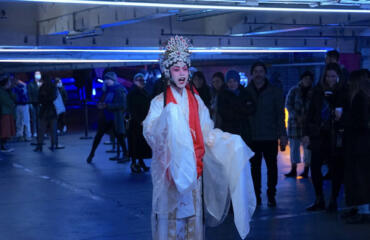
Anne Dorval and Antoine Olivier Pilon in Mommy. PIC: Sharmill Films
Mommy, 26 year-old French-Canadian Director Xavier Dolan’s fifth film, is not just the wunderkind’s breakthrough. It is a useful reminder that melodrama should not be a dirty word.
At the film’s centre is the relationship between troubled teenager Steve (Antoine Olivier Pion) and two women: his single mother Diane (a superb Anne Dorval), and neighbour Kyla (Suzanne Clément). Dolan uses this trio’s interactions to mine a deep well of emotion.
The setting is an alternative vision of Canada, where parents can donate their children to the state if they have behavioural problems. Much of the tension comes from the physically and emotionally tumultuous relationship between Steve and Diane as she determinedly takes care of him.

Dolan accentuates the melodrama most notably by filming these characters in a 1:1 square aspect ratio, eschewing conventional widescreen filmmaking.
This decision could easily feel like a gimmick were it not so creatively employed. The square aspect ratio impacts every subsequent creative choice, with Dolan liberally employing hasty pans and frenetic zooms to capture everything that’s happening. Thanks, in part, to the excellent performances, Dolan’s close-ups frame the human face in a way not seen at the cinema in decades.
Crucially, Dolan breaks out of this 1:1 ratio a couple of times in Mommy. The second time he moves into widescreen is the film’s pièce de résistance, and worth noting.
Dolan pushes the frame of his film outwards to present us with a montage of Diane’s hopes and dreams for her troubled son’s life. We see Steve getting into college, graduating, going on family vacations, eventually getting married — all in full, glorious widescreen.
You could mistakenly criticise this sequence as overfamiliar, the clichéd hallucinations of a young director who knows nothing of motherhood.
But Dolan’s showy embrace of the clichéd turns into a defence of their existence. It is a visual manifestation of the pain propelling Anne: she has spent her life trying, and failing, to secure a life for her family that many of us would consider so common as to be clichéd.
To see such intimate failure so frankly depicted on a screen that is momentarily enlarged is to feel the full force of Dolan’s melodrama. If you let it, it packs a hell of a punch.
Mommy is not perfect. Dolan’s more-is-more approach heightens the film’s emotional notes, but he lingers on some too long. Its dystopian framing comes across as a pointless, and cheap, attempt to raise the already large dramatic stakes.
And yet it would be absurd to let these grievances detract from the sheer scale of ambition on display. The emotional heft Dolan conjures is so strong that he forces you not only to acknowledge the film’s problems but to dismiss them. Mommy is as close to a masterpiece as a flawed film can get.
► 4 ½ stars
► Mommy is screening at Cinema Nova from Thursday, April 9.

